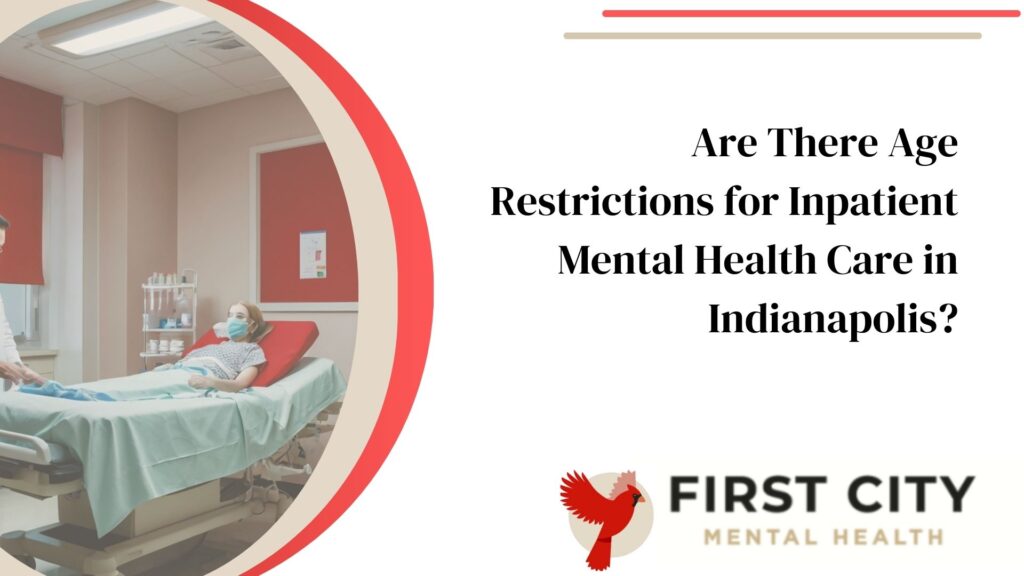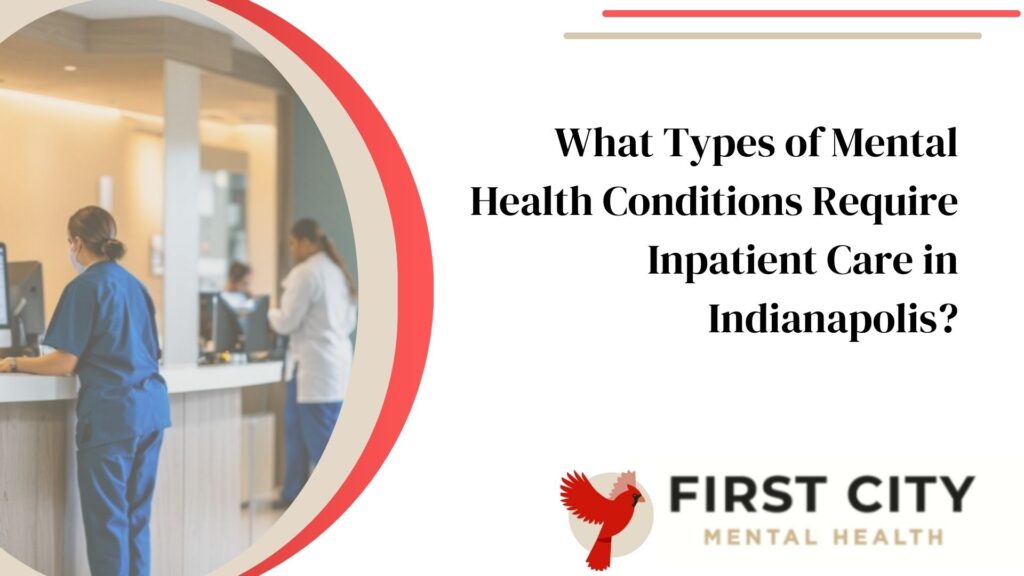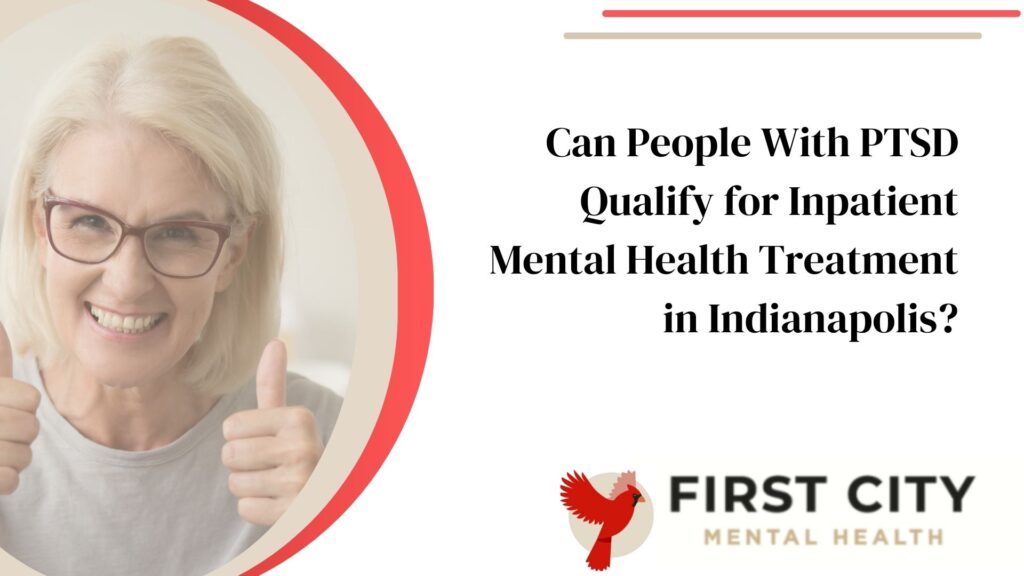
How Do You Choose the Right Partial Hospitalization Program in Indianapolis?
January 13, 2025
How to Prepare for an Indianapolis Inpatient Mental Health Stay?
January 14, 2025Deciding if someone needs inpatient mental health care can be tough. Many people in Indianapolis face this challenge and wonder if it’s the right step for them or their loved ones.
First City Mental Health Center offers intensive intervention services for adults with psychiatric symptoms, showing there’s support available right here in Indianapolis.
This article will guide you through understanding who qualifies for inpatient mental health in Indianapolis. We’ll discuss age restrictions, signs that indicate a need for care, and specific conditions that often require such treatment.
Key Takeaways
- FCMHC offers intensive mental health services for adults, and Medicaid covers psychiatric treatment for those under 21 if it’s medically necessary.
- To qualify for inpatient care, common signs include severe mood swings, prolonged sadness, withdrawal from social interactions, anxiety disorders leading to panic attacks, and suicidal thoughts or behaviors.
- A formal diagnosis aids in the admission process but isn’t always required; however, evidence of significant distress or danger to oneself or others is crucial.
- Conditions like major depressive disorder, bipolar disorder, schizophrenia, severe anxiety disorders, and PTSD often require the specialized support provided by inpatient facilities.
- Indiana laws allow involuntary admission for individuals with mental illnesses who pose dangers to themselves or others.
Who Can Benefit From Inpatient Mental Health Care in Indianapolis?
Moving from the broader topic of mental health care, a closer look at Indianapolis inpatient mental health care in Indianapolis reveals a wide range of individuals who can benefit significantly.
First City, one of the best inpatient mental health facilities in Indiana, offers intensive services for adults dealing with severe psychiatric symptoms. These programs are designed not just to address immediate crises but also to lay down a foundation for long-term recovery and stability.
For younger residents under age 21, Medicaid provides crucial support by covering psychiatric treatment that is deemed medically necessary. This ensures that adolescents have access to high-quality adolescent inpatient mental health facilities in Indiana when they need it most.
It’s particularly important for those showing signs of significant distress or dysfunction due to their mental health conditions. On another front, involuntary admission laws ensure that those who may not seek help themselves but are at risk can receive the care they need promptly and effectively.
Intensive intervention now can pave the way for brighter futures tomorrow.
Are There Age Restrictions for Inpatient Mental Health Care in Indianapolis?

In Indianapolis, age is a crucial factor in accessing best inpatient mental health facilities in Indiana care. For individuals under 21, Medicaid covers psychiatric treatment if doctors consider it medically necessary.
This stipulation allows younger people to access comprehensive support for mental health difficulties, provided the care aligns with medical standards. Conversely, Franciscan Health proposes inpatient services, especially for adults confronting severe psychiatric symptoms.
These facilities offer constant therapeutic care adjusted to manage intricate mental health and addiction disorders among adults.
Adults and young individuals have diverse routes to seek assistance from the adolescent inpatient mental health facilities that Indiana provides or any mental health facilities in Indianapolis.
This divergence makes certain that each age group gets suitable care that matches their developmental phase and unique needs. Next on the list: pinpointing common signs that might suggest someone qualifies for this intensity of care.
What Are the Common Signs Someone May Qualify for Inpatient Mental Health Care?
Identifying signs that someone may qualify for adolescent inpatient mental health facilities Indiana. Various warning signals can indicate the need for treatment. Individuals showing severe mood swings or prolonged sadness might benefit from inpatient services.
Other signs include drastic changes in behavior, such as withdrawal from social interactions or activities they once enjoyed.
For some, anxiety disorders can lead to crippling panic attacks or overwhelming feelings of dread. Those struggling with suicidal thoughts also warrant immediate attention and support.
In Indianapolis, facilities assess these symptoms closely to determine appropriate care levels. A diagnosis may influence admission decisions at many mental health facilities in Indianapolis, but individuals facing crises often receive urgent evaluations without a formal diagnosis first.
Do Indianapolis Facilities Require a Diagnosis for Inpatient Mental Health Admission?
Mental Health Facilities Indianapolis typically require a diagnosis for inpatient mental health admission. This helps ensure that patients receive appropriate care for their specific needs. Franciscan Health provides services primarily for adults experiencing psychiatric symptoms that need intensive intervention.
Medicaid covers inpatient psychiatric treatment for individuals under 21 when it is medically necessary.
Facilities often assess the severity of symptoms along with the diagnosis to determine if inpatient care is suitable. Indiana has laws governing involuntary commitment as well, which necessitate evidence of mental illness and potential danger to oneself or others.
Overall, these guidelines help maintain safety and efficacy in mental health treatment at Indianapolis inpatient mental health facilities.
What Types of Mental Health Conditions Require Inpatient Care in Indianapolis?

Inpatient mental health treatment care in Indianapolis serves individuals facing severe psychiatric symptoms. Conditions such as major depressive disorder, bipolar disorder, and schizophrenia often require intensive treatment.
Patients experiencing these disorders may struggle with daily functioning or have suicidal thoughts. Facilities like First City Mental Health provide round-the-clock support for adults during crises.
They offer a safe environment where medical professionals can closely monitor patients.
Anxiety disorders also qualify for inpatient care when they become debilitating. People suffering from panic attacks or generalized anxiety may find relief through structured programs in these facilities.
PTSD presents another reason for admission, especially if an individual poses a danger to themselves or others due to distressing memories or triggers. Involuntary admission can occur under specific Indiana laws for those who meet the criteria of danger or grave disability.
Is Inpatient Mental Health Care in Indianapolis Suitable for Anxiety Disorders?
Inpatient mental health care in Indianapolis can be suitable for individuals with anxiety disorders. Facilities offer intensive intervention for those facing severe psychiatric symptoms, including anxiety.
Symptoms may require close monitoring and therapeutic support that inpatient settings provide.
Severe anxiety may lead to risks, such as self-harm or inability to function daily. Medicaid covers inpatient psychiatric treatment for individuals under 21 when deemed medically necessary.
Individuals experiencing intense anxiety may benefit from the structured environment of inpatient mental health facilities in Indianapolis. These environments often include 24-hour therapeutic care specifically designed to meet specific needs.
Understanding how local facilities assess these situations helps families make informed decisions about care options available in Indianapolis.
How Do Indianapolis Facilities Assess the Need for Inpatient Mental Health Care?
Indianapolis facilities assess the need for inpatient mental health treatment care through a structured evaluation process. This process involves multiple steps to ensure proper diagnosis and treatment.
- Mental health professionals conduct thorough assessments. They gather information on symptoms, history, and current functioning.
- Facilities require evidence of significant distress or impairment. A patient must demonstrate how their condition affects daily life.
- Evaluators look for signs of crisis or danger. Evidence may include suicidal thoughts, self-harm behaviors, or threats to others.
- Medical histories play a crucial role in assessments. Professionals review previous treatments and any ongoing therapies.
- Facilities analyze the patient’s support system. Understanding family dynamics and social connections helps determine care needs.
- According to Indiana laws, involuntary admission requires court involvement. Authorities must confirm the individual poses a risk due to mental illness.
- Psychiatric evaluations help clarify diagnoses across conditions such as PTSD, anxiety disorders, or severe depression.
- Some patients require immediate intervention due to acute episodes requiring intensive care services found in inpatient mental health facilities in Indianapolis.
- Medicaid coverage can influence admission decisions for individuals under 21 when inpatient care is medically necessary.
- Assessments also evaluate whether outpatient services might suffice instead of immersive inpatient treatment options available at various locations in Indianapolis.
These assessments ensure that those needing acute treatment receive appropriate support customized to their specific conditions and circumstances while considering the best mental health facilities in Indianapolis for long-term care needs.
Can People With PTSD Qualify for Inpatient Mental Health Treatment in Indianapolis?

People with PTSD can qualify for inpatient mental health facilities in Indianapolis. Facilities like First City Mental Health offers intensive intervention for adults facing severe psychiatric symptoms.
Many individuals may require this level of care when their PTSD significantly impacts daily functioning.
Involuntary admission may occur if a person poses a danger to themselves or others due to their condition. In Indiana, evidence of mental illness and grave disability plays a crucial role in this process.
Medicaid covers inpatient services, ensuring access for those under 21 who demonstrate medical necessity. Options exist across various inpatient mental health facilities in Indianapolis aimed at treating complex conditions like PTSD effectively.
Conclusion
Understanding who qualifies for the best inpatient mental health facilities in Indiana is vital. Individuals facing severe psychiatric symptoms often need this type of intensive support. Age can influence eligibility, but many facilities cater to both adults and adolescents.
Common signs such as self-harm or suicidal thoughts indicate a potential need for admission. Having a formal diagnosis may help expedite the process but isn’t always required.
Accessing these services can greatly improve one’s mental well-being and overall quality of life. Resources are available for those seeking more information on treatment options in Indianapolis.
Taking action now could lead to effective solutions that foster healing and recovery. Prioritizing mental health matters profoundly in every individual’s journey toward wellness.
FAQs
What is inpatient mental health care in Indianapolis?
Inpatient mental health care in Indianapolis refers to a comprehensive treatment program provided at specialized facilities for individuals dealing with serious mental health issues.
Who can access adolescent inpatient mental health facilities in Indiana?
Adolescents struggling with severe or complex mental health conditions, who require constant monitoring and intensive therapy, qualify for the services offered by adolescent inpatient mental health facilities in Indiana.
How do I know if I qualify for an Inpatient Mental Health Facility?
Qualification depends on several factors such as severity of your condition, risk of harm to self or others, need for 24-hour supervision and previous response to outpatient treatments. It’s best to consult with a healthcare professional who can provide accurate guidance based on your specific situation.
Are there different types of Inpatient Mental Health Facilities available within Indianapolis?
Yes, there are various types of facilities including general psychiatric hospitals and specialized units within medical hospitals that cater to diverse needs like addiction recovery or trauma-related disorders.






